| Srl | Item |
| 1 |
ID:
100726
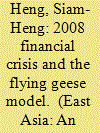

|
|
|
|
|
| Publication |
2010.
|
| Summary/Abstract |
In the twentieth century Japan embarked on an economic developmental path that came to be known as the Flying Geese Model. The geopolitical milieu after the Second World War provided Japan with favourable conditions for rapid economic growth and industrialization. By the 1950s, many had noticed the success of the model and it was subsequently adopted by other East Asian countries. They too enjoyed decades of remarkable economic growth. An important element of the model is growth driven by export to the USA and Europe. As a result of the 2008 financial crisis, the traditional markets of the geese are shrinking. The new situation poses grave challenges to both the existing flying geese economies and latecomer economies which wish to follow the model. East Asian countries are responding to the situation by broadening and deepening their existing economic linkages and developing new ones. This represents a continuation of East Asian regionalism in the wake of the 1997 financial crisis.
|
|
|
|
|
|
|
|
|
|
|
|
|
|
|
|
| 2 |
ID:
090011
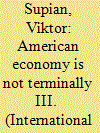

|
|
|
|
|
| Publication |
2008.
|
| Summary/Abstract |
In the early 21st century, political and economic configuration of the contemporary world has become much more complicated which explains why the claims of political and economic hegemony in the world as well as the unipolar world of the early post-Soviet period are causing much more doubts than before. Economic dynamics of large developing countries such as China, India and Brazil; Russia's gradual economic revival coupled with its much greater role in the world power supply; much wider economic potential of the European Union achieved thanks to the new members; the serious financial and socioeconomic problems in the United States that surfaced in the latter half of the current decade - all this is adding fuel to the discussion about America's ability to remain the economic, and hence, military-political leader of the contemporary world.
|
|
|
|
|
|
|
|
|
|
|
|
|
|
|
|
| 3 |
ID:
125936
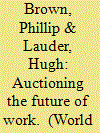

|
|
|
|
|
| Publication |
2013.
|
| Summary/Abstract |
The 2008 financial crisis wiped trillions of dollars off the value of the world's financial markets, but it did little to halt the explosion in college education. Families from all walks of life and governments of all political persuasions embrace the idea that investing in a college education offers students a route to middle-class prosperity. Difficult economic times in much of the world only reinforce the myth that education triggers economic growth and resolves problems of inequality.
|
|
|
|
|
|
|
|
|
|
|
|
|
|
|
|
| 4 |
ID:
152590
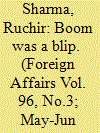

|
|
|
|
|
| Summary/Abstract |
The global recovery from the Great Recession of 2009 has just entered its eighth year and shows few signs of fading. That should be cause for celebration. But this recovery has been an underwhelming one. Throughout this period, the global economy has grown at an average annual pace of just 2.5 percent—a record low when compared with economic rebounds that took place in the decades after World War II. Rather than rejoicing, then, many experts are now anxiously searching for a way to push the world economy out of its low-growth trap. Some economists and investors have placed their hopes on populists such as U.S. President Donald Trump, figuring that if they can make their countries’ economies grow quickly again, the rest of the world might follow along.
|
|
|
|
|
|
|
|
|
|
|
|
|
|
|
|
| 5 |
ID:
100440
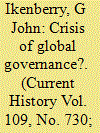

|
|
|
| 6 |
ID:
116102
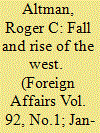

|
|
|
|
|
| Publication |
2013.
|
| Summary/Abstract |
The 2008 financial crisis and the Great Recession that followed have had devastating effects on the U.S. economy and millions of American lives. But the U.S. economy will emerge from its trauma stronger and widely restructured. Europe should eventually experience a similar strengthening, although its future is less certain and its recovery will take longer to develop. The United States is much further along because its financial crisis struck three years before Europe's, in 2008, causing headwinds that have pressured it ever since. It will take another two to three years for these to subside, but after that, U.S. economic growth should outperform expectations. In contrast, Europe is still in the midst of its financial crisis. If historical logic prevails there, it will take four to six years for strong European growth to materialize.
|
|
|
|
|
|
|
|
|
|
|
|
|
|
|
|
| 7 |
ID:
111028


|
|
|
|
|
| Publication |
2012.
|
| Summary/Abstract |
The financial crisis of 2008 and even more so the crisis of the Eurozone drastically increased the demand for decisive leadership and public crisis management. Due to the size of its economy and its position in the global as well as in the European economy, Germany should take the lead in this crisis management. Germany's management of the two crises differs but also shows strong similarities. A "center-left Grand Coalition" managed the global financial crisis; a global crisis in which Germany was one among several relevant global players. A center-right government under the leadership of the same chancellor then during the sovereign debt crisis manages the Eurozone crisis. This is a regional crisis but with global implications. German government was slow in responding to both crises but acted eventually after some procrastination. Both cases, however, differ with regards to Germany's actual role in crisis management. During the global financial crisis, other global actors pushed Germany to the forefront. The Eurozone crisis, a regional crisis, demands a leading role of Germany, the largest economy and member state of the EU. The paper, however, argued that the German crisis management with regards to the Eurozone is very much driven by ideas that preserve German norms but do not live up to the challenges of the crisis. Germany's insistence in its own interests and norms hinders the delivery of a comprehensive crisis management of the Eurozone crisis within the European Union.
|
|
|
|
|
|
|
|
|
|
|
|
|
|
|
|
| 8 |
ID:
096167
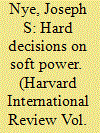

|
|
|
| 9 |
ID:
154244
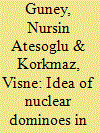

|
|
|
| 10 |
ID:
096407
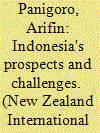

|
|
|
| 11 |
ID:
131134
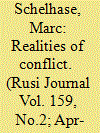

|
|
|
|
|
| Publication |
2014.
|
| Summary/Abstract |
Risk management' has become big business in the wake of the 2008 financial crisis but it has long been a crucial element of operational leadership for military decision-makers. In this article, Marc Schelhase explores the understanding and application of theories of risk in the military context - and particularly at the operational level - analysing the impact of societal, organisational and personal factors on the conceptualisation and mitigation of risk.
|
|
|
|
|
|
|
|
|
|
|
|
|
|
|
|
| 12 |
ID:
121778
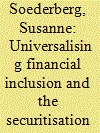

|
|
|
|
|
| Publication |
2013.
|
| Summary/Abstract |
In the wake of the 2008 financial crisis the G20 leaders have attempted to universalise financial inclusion as a key development strategy Financial inclusion, which has long been championed by official development institutions as a sound and effective market-based solution to combat poverty, is also now promoted by the G20, not only as a way out of the ongoing global recessionary environment but also as an important scheme to stabilise the world economy. To this end the G20 Financial Inclusion Experts Group forged the G20 Principles for Innovative Financial Inclusion in 2010 (the G20 Principles). Drawing on a historical materialist lens, I argue that the G20 Principles- which represent extensions of, as opposed to a departure from, the neoliberal development project-serve to legitimate, normalise, and consolidate the claims of powerful, transnational capital interests that benefit from finance-led capitalism. The primary way this is achieved is through obscuring and concealing the exploitative relations and speculative tendencies involved in financial inclusion strategies.
|
|
|
|
|
|
|
|
|
|
|
|
|
|
|
|
| 13 |
ID:
092529
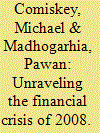

|
|
|
|
|
| Publication |
2009.
|
| Summary/Abstract |
In the fall of 2008, the world economy experienced a "once-in-a-century credit tsunami" (Greenspan 2008, 1). Centered in the market for homes and mortgages, the mechanisms that unleashed this financial tidal wave are many and complex. Indeed, an inadequate grasp of modern finance on the part of "the most sophisticated investors" and regulators "in the world" was itself a contributing factor (Greenspan 2008, 3).
|
|
|
|
|
|
|
|
|
|
|
|
|
|
|
|